Você está usando o recurso de publicidade do Jetpack em seu site?
Recentemente, enquanto navegávamos pelo Facebook, encontramos várias pessoas compartilhando links onde o WordPress substituiu o domínio do site. Além disso, o status também dizia algo como: Michelle Schulp publicou um artigo no WordPress.
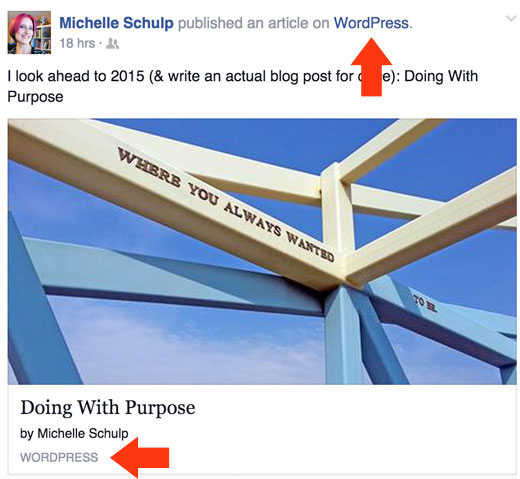
Isso foi alarmante, então decidimos investigar o problema.
Quando você clica no link, ele leva você ao site. No entanto, quando você clica em WordPress, ele leva você a uma página de inscrição do WordPress.com no Facebook.
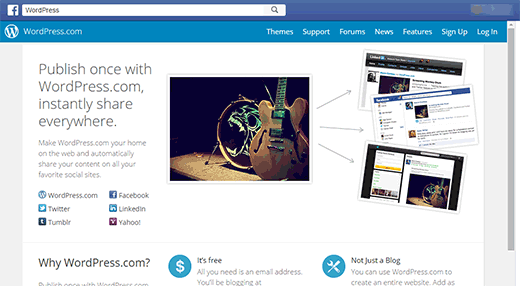
Investigamos mais para ver se esses sites estavam hospedados no WordPress.com, um serviço de hospedagem de blogs. A maioria deles não estava. (veja a diferença entre WordPress.com gratuito vs WordPress.org auto-hospedado)
No entanto, todos eles tinham uma coisa em comum. Todos eles estavam usando o plugin Jetpack, que é criado pela empresa controladora do WordPress.com, a Automattic.
Para verificar nossas descobertas, decidimos instalar o Jetpack em um site de teste. Reproduzimos o problema, e ele está conectado ao recurso de publicidade do plugin.
Ao configurar o recurso de publicidade, você é solicitado a se conectar com o Facebook e conceder várias permissões.
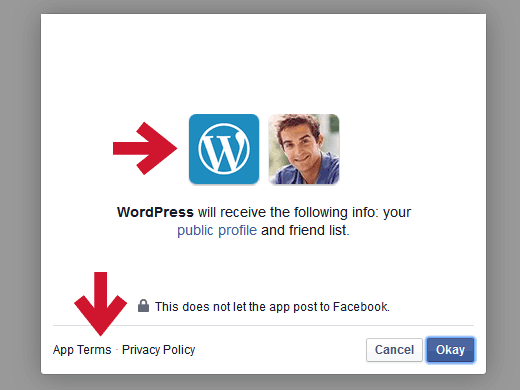
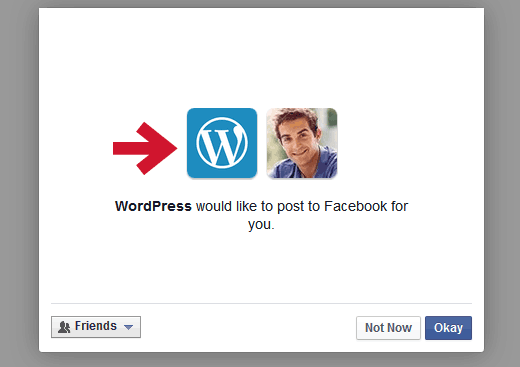
Durante o processo de permissão, você vê o logotipo azul do W em vez do logotipo cinza do W. Qual a diferença?
Bem, um é para WordPress.com (o serviço de hospedagem de blogs) e o outro é para WordPress.org (o software que todos nós amamos e usamos).
Confuso, não é?
Frequentemente, os iniciantes não sabem a diferença, então pensam que estão realmente autorizando seu site WordPress, e não uma plataforma de terceiros WordPress.com (veja as relações e diferenças)
Além disso, a redação durante todo o processo não deixa claro que você está autorizando o WordPress.com em vez do seu site real. Veja a captura de tela de confirmação abaixo:
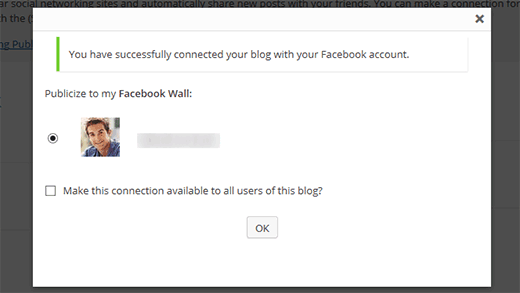
Agora, se você quer que o Publicize faça o que deveria fazer (compartilhar automaticamente sua postagem quando ela for publicada), é isso que seus usuários verão.
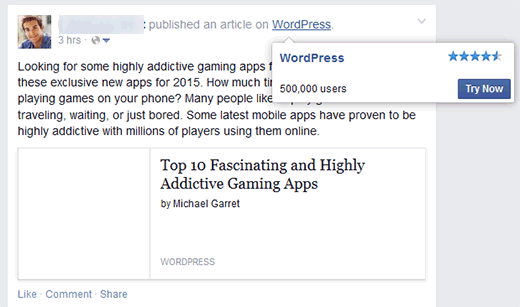
Fizemos mais pesquisas para descobrir que não é um problema novo. Ele tem sido relatado várias vezes desde 2013.
Considerando que o Jetpack é pré-instalado e pré-ativado em vários provedores de hospedagem WordPress importantes por padrão, isso deve ser corrigido para diminuir a confusão entre WordPress.com vs WordPress.org auto-hospedado.
Embora entendamos que o Facebook tenha suas limitações, há certas coisas que podem e devem ser corrigidas para informar melhor os usuários.
Primeiro, nos dados do link abaixo do título da postagem, ele deveria mostrar o domínio do usuário para promover sua marca em vez de mostrar WordPress. Como Jeremy, da equipe Jetpack, apontou nos comentários abaixo, isso não é possível devido a restrições do Facebook.
Segundo, a redação que diz que Syed Balkhi publicou um artigo no WordPress deve ser reformulada para esclarecer a confusão.
Um dos usuários que relatou o problema ofereceu uma sugestão de redação: Vikas compartilhou um link via Publicize em vez de dizer que Vikas publicou um artigo no WordPress.
Outra alternativa poderia ser: … compartilhou um link via JetPack porque é isso que realmente está acontecendo.
Por último, na caixa de diálogo de confirmação, deveria dizer “você conectou Jetpack com sucesso ao Facebook” ou “você conectou com sucesso sua conta do Facebook ao Jetpack”. [Atualização: Ticket #1476 criado por Jeremy]
Esperamos que estas sugestões ajudem a melhorar a experiência do Jetpack Publicize para os usuários.
O Jetpack é um ótimo plugin para iniciantes que migram do WordPress.com para o WordPress.org porque permite reter muitos recursos interessantes do WordPress.com, ao mesmo tempo que oferece o poder e a liberdade do WordPress.org.
Observação: O objetivo deste post não é iniciar uma guerra de discussões, mas sim encorajar o debate e compartilhar nossa opinião com a comunidade. Temos um tremendo respeito e apreço pela Automattic e pelo trabalho que eles realizaram.
Se você gostou deste artigo, por favor, inscreva-se em nosso Canal do YouTube para tutoriais em vídeo do WordPress. Você também pode nos encontrar no Twitter e Google+.






Moinuddin Waheed
Eu uso o plugin Jetpack há muito tempo, desde os dias iniciais (não estou usando agora) e nunca soube que é a empresa, talvez sua empresa controladora, a Automattic, por trás do WordPress.com.
Eles fizeram um trabalho tremendo para o WordPress, claro, o WordPress.org, e ajudaram muitos clientes com seus recursos interessantes.
Obrigado, WPBeginner, por nos informar como abordar algo tão bem sem ofendê-los.
inos
olá, senhores especialistas! eu sou inos. sou um verdadeiro iniciante em wp. agora estou começando a construir meu blog pessoal. decidi ter uma hospedagem pessoal para meu blog. depois de alguma experiência no wordpress.com, estou muito interessado em alguns recursos herdados do wordpress.com, um dos quais é a capacidade de mostrar minhas postagens do blog nos leitores de wp. instalei o jetpack com sucesso, mas não vejo nenhuma das minhas postagens aparecer no leitor de wp. como fazer isso? obrigado..
WPBeginner Support
Olá Inos,
Se o URL do seu site mudou após a migração para um site auto-hospedado WordPress.org, seus usuários precisarão Seguir seu site novamente. Eles verão suas postagens no leitor em Sites Seguidos.
Admin
Jay
A palavra wordpress está lá porque é o aplicativo WP FB que está sendo usado, não acho que você possa fazer muito a respeito. Se tiver que ser substituído pelo título do blog ou título do site, então tem que haver alguma maneira de alterar dinamicamente as configurações do aplicativo. Duvido que haja tal maneira no momento
Sacha
Isso é muito sorrateiro mesmo!
Eu uso o Jetpack para alguns de seus melhores recursos, mas nunca gostei do Publicize.
WP para Twitter é melhor.
Rozz
Não use Jetpack. Use plugins escritos corretamente como Next Scripts. Eles são mais confiáveis e configuráveis.
Michele Pellegrino
Olá, este comentário é para ROZ, só queria agradecer por recomendar o plugin NextScript para postar meu blog em plataformas de mídia social, em vez do JetPack. O NextScript fez sentido e me permitiu especificar a postagem indo para minha página de fãs e NÃO para minha página pessoal e foi muito facilmente configurável. Muito apreciado, e um plugin muito melhor!
Justin
Você recomenda outro plugin além do Jetpack para publicar posts do WP em redes sociais?
Eu uso Jetpack e realmente não tenho muitos problemas com a promoção do wordpress, mas me disseram que “o Jetpack em particular é um plugin muito inchado, pois tem muitos recursos e mini-plugins integrados. O código-fonte do Jetpack é ainda maior que o código do Wordpress. Se você não estiver usando a maioria de seus recursos, será melhor desativá-lo e excluí-lo.”
Eu só uso o Publicize e os ícones sociais em cada postagem do blog. Agradeço antecipadamente!
Asif2BD
Primeiramente, @SyedBalkhi você voltou para o Disqus de novo!
Ultimamente o JetPack continua voltando por coisas negativas. É apenas um subsistema repleto de recursos (não o chamarei de plugin), mas provavelmente demais em um pacote.
John Nadeau
Forgive me but now I’m confused I have a WordPress.org site self-hosted at http://LeLacAppelle.com. I use (and love) JetPack to publicize my posts to Facebook Page. I don’t see any reference to WordPress.com in my Facebook Page Posts EXCEPT when I’m logged in as an admin/manager to my Facebook Page. Even then it only says “Posted by Wordpress” in gray and a note upon hovering over the question mark “only people that manage this page can see who posted”. Can you look at my Facebook Page at the first two most-recent posts and tell me if you see any reference to WordPress.com ? https://www.facebook.com/TheLakeIsCalling OH WAIT… I’m posting from my WordPress.org Site > JetPack > to a Facebook “PAGE”. Is that the difference? If I were to post to my own “Personal” Facebook Profile/Page, then would I see the behavior you speak of ?
I have a WordPress.org site self-hosted at http://LeLacAppelle.com. I use (and love) JetPack to publicize my posts to Facebook Page. I don’t see any reference to WordPress.com in my Facebook Page Posts EXCEPT when I’m logged in as an admin/manager to my Facebook Page. Even then it only says “Posted by Wordpress” in gray and a note upon hovering over the question mark “only people that manage this page can see who posted”. Can you look at my Facebook Page at the first two most-recent posts and tell me if you see any reference to WordPress.com ? https://www.facebook.com/TheLakeIsCalling OH WAIT… I’m posting from my WordPress.org Site > JetPack > to a Facebook “PAGE”. Is that the difference? If I were to post to my own “Personal” Facebook Profile/Page, then would I see the behavior you speak of ?
Syed Balkhi
Eu também não estou vendo a publicação no WordPress, então é possível que isso seja apenas para perfis pessoais em vez de páginas, apenas diz que compartilhou um link.
Jeremy
Sim, o Facebook não oferece a mesma funcionalidade para Páginas. Histórias Personalizadas são exibidas apenas em linhas do tempo pessoais.
Cameron Archibald
Espero que este problema Jetpack vs Facebook possa ser resolvido. Mas suponho que a melhor maneira de compartilhar artigos ou posts de blog é fazê-lo manualmente. Ninguém gosta de uma máquina de qualquer maneira. Eu também ouvi dizer que postar manualmente vs automaticamente pode ser descoberto pelo Google da mesma forma que pode ser pelos usuários e o SEO Juice é distribuído de forma diferente.
Khürt L. Williams
"... postar manualmente vs automaticamente pode ser descoberto pelo Google". Eu gostaria de ver algo para apoiar isso. Sério, a menos que a automação inclua algum tipo de identificador, isso não é possível. Nem acho que o Google se importe. Por que se importaria?
takien
Não é um problema para mim.
ebarney
Esta é uma pergunta um tanto tangencial, mas a funcionalidade de publicidade não é "compartilhamento implícito" através de um aplicativo, de acordo com o algoritmo do Facebook?
Para as páginas que gerencio, paramos de usar a publicidade via JetPack para conteúdo de blog após as mudanças do algoritmo da primavera passada que desvalorizam o compartilhamento implícito via aplicativos (http://newsroom.fb.com/news/2014/05/news-feed-fyi-giving-people-more-control-over-when-they-share-from-apps/)
Copiar manualmente links de artigos e usar o depurador de links do Facebook para garantir que eles estejam funcionando como queremos tem o melhor efeito no conteúdo realmente sendo visualizado: https://developers.facebook.com/tools/debug/
Khürt L. Williams
O link newsroom.fb.com não funcionou.
Como é o seu UL que faria com que ele fosse renderizado de forma diferente quando compartilhado via Jetpack em comparação com um copiar e colar?
ebarney
Acho que fechei minha resposta anterior sem postá-la, desculpe
Cole isto após a URL base newsroom.fb.com e veja se funciona para você: /news/2014/05/news-feed-fyi-giving-people-more-control-over-when-they-share-from-apps/
O compartilhamento via Jetpack é menos enfatizado nos feeds de notícias dos seus leitores em comparação com pegar o URL exato e copiá-lo e colá-lo manualmente na caixa "compartilhar isto" em uma página do Facebook, é isso que a mudança de algoritmo do FB faz, pelo que pude apurar.
Não é um link diferente, apenas um tratamento diferente do link com base em onde/como ele é submetido ao software do FB.
Falando sobre o algoritmo do FB e páginas, há muitas outras preocupações para os proprietários de páginas sobre como o conteúdo que você compartilha NÃO é visualizado – não relacionado ao Jetpack, mas questões de conteúdo: http://newsroom.fb.com/news/2014/11/news-feed-fyi-reducing-overly-promotional-page-posts-in-news-feed/
Paul Ames
Ótima descoberta, obrigado, odeio o Facebook de qualquer forma por essa parte.
Alastair McDermott
Serei honesto, pensei que isso fosse pura autopromoção do pessoal do WP.com. Mas, como sempre nessas coisas, há outra opção: eles estão usando um aplicativo comum para facilitar o compartilhamento e não confundir a questão pedindo chaves. (Desculpas por presumir o pior, pessoal do Jetpack)
Minha preferência é que eles documentem o comportamento atual no aplicativo para serem um pouco mais transparentes sobre as coisas e darem uma opção para usar um aplicativo personalizado alternativo. Mas isso adiciona um pedaço significativo de funcionalidade e imagino que a equipe do Jetpack seja bastante rigorosa quanto a qualquer linha de código adicional para combater o possível inchaço.
Jeremy
Olá!
Trabalho na Automattic e faço parte da equipe do Jetpack.
Em primeiro lugar, obrigado pelo feedback!
Essa pode ser realmente uma questão confusa. Como você mencionou, o Facebook tem suas limitações, tornando as coisas complicadas ou às vezes impossíveis sempre que você deseja personalizar a saída de uma atualização postada de um aplicativo.
To use your own site name or brand there, you’d have to use your own Facebook app. Since Jetpack aims to help you easily push your content to multiple Social Networks, we won’t ask you to create a Facebook developer account, create an app, change the app settings, and copy app ID and secrets somewhere in your WordPress dashboard. That’d be the opposite of “easy”
Isso não é algo que você possa mudar, quer você use o Jetpack ou qualquer outro aplicativo para postar em seu Perfil do Facebook. O próprio Facebook constrói a atualização e a frase de compartilhamento com base nas configurações do aplicativo e nos tipos de objeto. Você pode ler mais sobre isso aqui:
https://developers.facebook.com/docs/opengraph/creating-custom-stories/
Essa seria de fato uma opção. Na verdade, costumava dizer "WordPress.com" em vez de "WordPress" no passado. Mudamos para "WordPress" porque os usuários do Jetpack achavam confuso ver "WordPress.com" lá.
Já consideramos outras opções, sendo o “Jetpack” uma delas. Infelizmente, isso não é possível com a forma como nosso sistema é construído no momento, pois usamos um único aplicativo para sites WordPress.com e sites Jetpack.
Ainda está no nosso roteiro, no entanto! Estamos trabalhando em muitas melhorias para o módulo Publicize e lançaremos essas alterações em breve em uma atualização que chamamos de "Publicize Next". Você pode conferir algumas das coisas em que estamos trabalhando aqui:
https://github.com/Automattic/jetpack/milestones/Publicize%20Next
Não tenho certeza se entendi sua sugestão aqui. Você quer substituir “seu blog” por “Jetpack”?
Eles vão! Estamos sempre felizes em iterar e melhorar as coisas com base no feedback dos usuários.
Se encontrar bugs, você também pode entrar em contato conosco diretamente ou criar um issue no GitHub!
Syed Balkhi
Obrigado pela resposta detalhada, Jeremy. Entendo as limitações técnicas de por que um usuário não pode mudar o verbo “publicou um artigo no WordPress”.
Meu ponto é que vocês (equipe Jetpack) podem, como desenvolvedores de aplicativos, representar com precisão a ação, e fico feliz em ver que vocês já estão trabalhando nisso.
This confusion can be solved if Jetpack uses a separate Publicize app for .org sites rather than using the main WP.com app — this keeps the “easiness” entact for users
Quanto à caixa de diálogo de confirmação, atualmente diz que seu blog está conectado ao Facebook. Isso implica uma conexão direta, mas há um terceiro envolvido (atualmente WordPress.com).
Acho que uma mensagem de confirmação clara diria: “Você conectou sua conta do Facebook com sucesso ao Jetpack”.
Isso seria perfeito se/quando houver um aplicativo independente para o Jetpack.
Mais uma vez, obrigado pela sua resposta e estou ansioso pela nova versão.
Jeremy
Adicionei sua sugestão aqui e a consideraremos para uma futura atualização do Jetpack:
https://github.com/Automattic/jetpack/pull/1476
Syed Balkhi
Thanks for your consideration Jeremy
George Stephanis
> This confusion can be solved if Jetpack uses a separate Publicize app for .org sites rather than using the main WP.com app — this keeps the “easiness” entact for users
Mas se fizéssemos isso, como isso resolveria sua afirmação de que estamos 'usando indevidamente as marcas dos usuários' para promover o Jetpack? É apenas mudar a palavra de WordPress para Jetpack, que é ainda mais associada à nossa marca do que o genérico WordPress.
Syed Balkhi
George, ter o nome do aplicativo no status é um comportamento natural no Facebook, eu entendo isso.
A questão que está criando confusão aqui é o termo “WordPress”, que existem dois. O software de código aberto e a empresa de hospedagem WordPress.com
Além disso, a escolha da palavra no objeto de ação do seu aplicativo aumenta a confusão:
“publicado em”
Se a ação disser publicado em WordPress.com (isso não seria uma descrição imprecisa da ação porque o usuário não está fazendo isso?) — Assim como dizer publicado em WordPress enquanto exibe o aplicativo wp.com também é impreciso.
Isso implica que o usuário está publicando seu artigo no WordPress.com, o que é uma declaração enganosa.
Se você descrever a ação com precisão:
XYZ compartilhou um link via Jetpack, então você não está enganando ninguém.
wycks
> That’d be the opposite of “easy”
A propósito, eu uso um aplicativo que não é do WordPress que dá ao usuário 2 opções de publicação.
Opção 1: Publicação fácil, que usa as configurações de plugin mencionadas acima.
Opção 2: Domínio personalizado e configurações do aplicativo, isso requer cerca de 5 minutos de trabalho e, para ser honesto, você só precisa copiar/colar as chaves do aplicativo e preencher no máximo 2 campos e salvar.
Você realmente deveria considerar dar ambas as opções ao seu usuário. Fácil não significa o que você pensa que significa, nem realmente atende a todos os usuários.
Jeremy
Isso é algo que definitivamente consideraremos ao trabalhar em “Publicize Next”, como mencionei acima. Se oferecêssemos essa opção, provavelmente teríamos que mantê-la simples, para evitar sobrecarregar o painel com mais opções. Mas podemos ver se conseguimos fornecer filtros para fazer isso. Criei uma issue para acompanhar essa ideia aqui.
Keep in mind that all communication with Facebook is done via WordPress.com, though, so it makes things a bit more complicated for us as we’d have to build a new system to allow you to post from your site to your Facebook app without going through WordPress.com and our app. I’m not saying it’s impossible, but at that point, and since there are already plugins that do that well, it might be best to use one of these plugins instead. You don’t have to use each and every Jetpack module, it’s perfectly fine to deactivate a module and use something else when you need something different
“Fácil” pode não ter sido a melhor maneira de descrever o que eu tinha em mente.
A forma como o Publicize funciona hoje é certamente mais rápida de configurar do que se você tivesse que criar seu próprio aplicativo. É uma solução pronta, muito parecida com a maioria dos outros módulos do Jetpack.
You could get by by copying and pasting things around and following instructions, but you would also become responsible for your own app, and for keeping up with any changes Facebook may make to the system and the interface later on. It works, but it’s not for everyone.
Khürt L. Williams
Acho que fácil, neste contexto, é mais sobre compreensão – fácil de entender ou “não tenho ideia do que é uma chave de API do Facebook ou como obtê-la. Me dê o botão fácil”.
A Opção 2 é puro jargão técnico. Fácil para você é um obstáculo para os outros.
Jeff Yablon
Isso é… perturbador, mas não surpreendente. Também é uma notícia meio velha.
Falando pragmaticamente, posso defender o WordPress, da mesma forma que defenderia o Facebook quando eles inventam um endereço de e-mail para você ou o Disqus, o serviço que processa esses comentários, quando eles roubam seu suco de SEO.
Falando de forma um pouco mais implacável, posso dizer algo como: “eles te dão algo de graça, e embora provavelmente tenham divulgado as políticas em termos de serviço densos que nem você nem ninguém jamais leram, eles divulgaram, … err … certo? Então aguenta.”
Mas falando honestamente, tenho medo que minha reação volte principalmente para o ângulo de “nada surpreendente”. Não surpreso que eles tenham feito isso, e não surpreso que você não tenha parado e considerado que isso ia acontecer.
Em sua essência, é disso que se trata http://thewordpresshelpers.com. E embora criticar o WordPress/Automattic, et.al. não seja o objetivo, o que nos interessa é criticar todos por tudo; A Comunidade WordPress é, sem dúvida, maior e mais importante do que o Facebook ou qualquer outra nação digital… e todos os seus cidadãos têm a responsabilidade de agir como membros envolvidos e informados da comunidade.